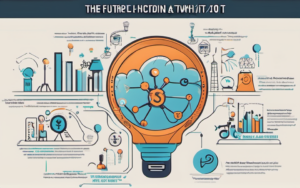The world of technology is constantly evolving, with new innovations emerging at an unprecedented pace. Emerging Technologies are shaping our present and will undoubtedly define our future. From the rise of artificial intelligence to the potential of quantum computing, these advancements hold the power to revolutionize every aspect of our lives.
The Future is Now: A Glimpse into Emerging Technologies
Artificial Intelligence: The Rise of the Machines
Artificial intelligence (AI) is no longer a futuristic concept. It’s already deeply embedded in our daily lives, from the personalized recommendations we see on streaming platforms to the voice assistants that control our smart homes. AI is rapidly advancing, with deep learning algorithms enabling machines to perform tasks that were once considered the exclusive domain of humans. This progress has led to the development of self-driving cars, AI-powered medical diagnoses, and sophisticated chatbots that can hold conversations that are eerily human-like.
Biotechnology: Redefining Human Potential
Biotechnology is pushing the boundaries of what is possible in healthcare and beyond. Advances in gene editing, personalized medicine, and synthetic biology are leading to groundbreaking treatments for diseases, the development of new drugs, and even the possibility of extending human lifespans. Biotechnology is also driving innovation in agriculture, with genetically modified crops that are more resistant to pests and diseases, and in environmental science, with bioremediation techniques used to clean up pollution.
Quantum Computing: Unlocking the Secrets of the Universe
Quantum computing is one of the most exciting and potentially transformative technologies on the horizon. Unlike traditional computers, which rely on bits that represent either 0 or 1, quantum computers use qubits, which can exist in a superposition of states, representing both 0 and 1 simultaneously. This unique ability allows quantum computers to solve problems that are impossible for even the most powerful classical computers, such as simulating complex molecules, breaking encryption codes, and developing new materials.
Virtual and Augmented Reality: Blurring the Lines Between Reality and Imagination
Virtual reality (VR) and augmented reality (AR) are immersive technologies that are changing the way we interact with the world around us. VR creates entirely virtual environments that users can explore and interact with, while AR overlays digital information onto the real world, enhancing our perception of reality. These technologies are finding applications in gaming, education, healthcare, and even architecture, offering new ways to learn, explore, and create.
Outrageous Predictions: Where Technology Will Take Us
AI Assistants as Our Personal Companions
Imagine a world where AI assistants are not just helpful tools but also personal companions. They could learn our preferences, understand our emotions, and provide us with personalized support and companionship. These AI companions could offer us a sense of connection and belonging, especially for those who are isolated or lonely. While the idea of having AI companions may seem outlandish today, it’s a possibility that could become a reality in the not-too-distant future.
Gene Editing for Enhanced Human Abilities
The ability to edit genes is opening up a world of possibilities, from curing genetic diseases to enhancing human abilities. Some experts predict that gene editing could eventually be used to improve muscle strength, cognitive function, and even lifespan. This raises profound ethical questions about the potential for creating genetic inequality and the line between curing disease and enhancing human capabilities.
Quantum Computers Solving Unsolvable Problems
The potential of quantum computers is vast and largely unexplored. Some experts believe that quantum computers could eventually be used to solve some of the world’s most pressing problems, such as climate change, disease outbreaks, and even poverty. They could also revolutionize fields like materials science, drug discovery, and artificial intelligence.
Virtual Worlds as Our Second Homes
Virtual reality is already blurring the lines between the real and the virtual, and some experts predict that virtual worlds will become increasingly sophisticated and immersive, eventually becoming our second homes. We could spend our days working, socializing, and even pursuing hobbies in these virtual worlds, interacting with others in realistic ways.
The Ethical Implications of Emerging Technologies
Job Displacement and Economic Disruption
The rapid advancement of AI and automation is already leading to job displacement in many industries. As machines become more capable, they are taking over tasks that were once performed by humans, leading to concerns about mass unemployment and economic disruption. It’s crucial to address these concerns by investing in education and training programs that prepare workers for the jobs of the future.
Privacy Concerns and Data Security
Emerging technologies raise significant privacy concerns. AI systems collect vast amounts of data about our behavior, preferences, and even our emotions. This data can be used for targeted advertising, but it can also be misused to manipulate us or even harm us. It’s essential to develop robust data privacy laws and regulations to protect individuals’ rights in the digital age.
The Potential for Misuse and Weaponization
The same technologies that have the potential to improve our lives can also be used for harmful purposes. AI, for example, can be used to create sophisticated weapons systems, spread disinformation, and even control people’s minds. It’s critical to develop ethical frameworks and international agreements to prevent the misuse of these technologies.
Navigating the Future: Embracing the Potential of Emerging Technologies
Education and Skill Development for the Future Workforce
The future of work will be shaped by emerging technologies. It’s essential to invest in education and training programs that equip individuals with the skills they need to succeed in this rapidly evolving job market. This includes developing skills in areas like data science, AI, and cybersecurity.
Regulation and Ethical Frameworks for Responsible Innovation
Emerging technologies raise complex ethical questions that require careful consideration. We need to develop regulatory frameworks that ensure responsible innovation and prevent the misuse of these technologies. This includes promoting transparency and accountability in the development and deployment of AI systems, establishing ethical guidelines for gene editing, and ensuring that the benefits of emerging technologies are shared equitably.
Collaboration and Global Partnerships for a Shared Future
The challenges and opportunities presented by emerging technologies are global in scope. We need international collaboration and partnerships to address these challenges and harness the potential of these technologies for the benefit of all. This includes sharing knowledge, developing common standards, and coordinating policy responses.
The future is uncertain, but it’s clear that emerging technologies will play a defining role in shaping the world to come. By embracing the potential of these technologies while addressing their ethical implications, we can create a future that is both prosperous and equitable.




